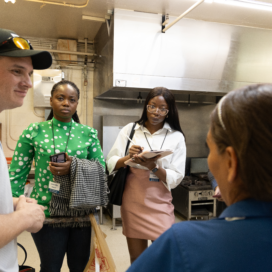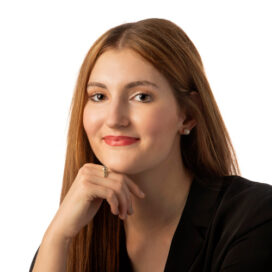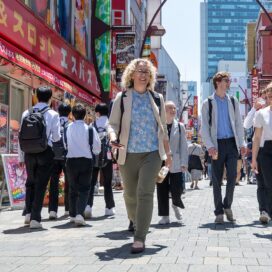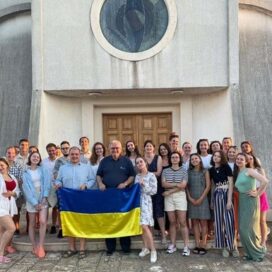Undergrads gain global business perspective in Poland
Published: September 7, 2023 / Author: Brandi Wampler
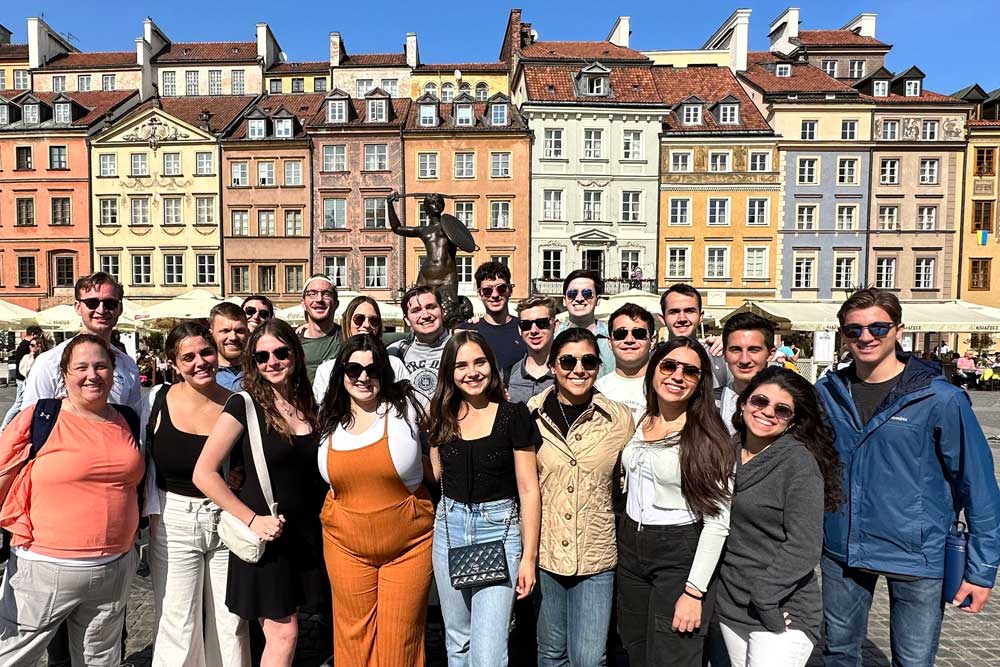
Deloitte Scholars in Poland
Right now, Poland is important not only geopolitically, but also economically. With a free market economy that is just over 30 years old, the country has one of the fastest, consistent growing economies in Europe, surviving both the 2008 financial crisis and COVID-19 pandemic mostly unscathed.
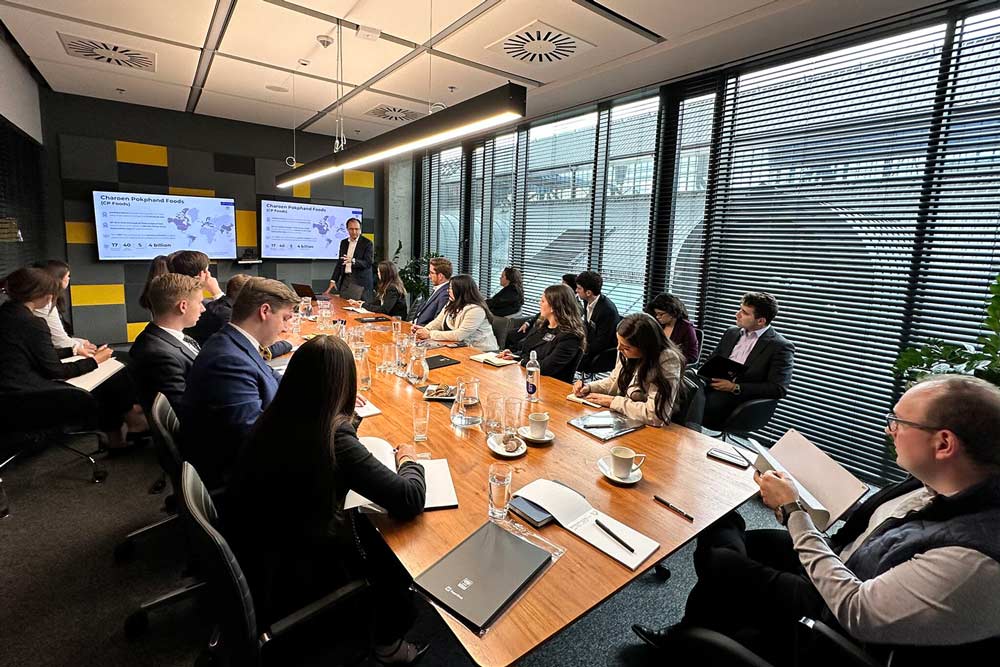 This is why Sabrina Curran (FIN ‘23) and Poland-native Filip Kubicki (FIN ‘24), students at the University of Notre Dame’s Mendoza College of Business, submitted a proposal to start the Deloitte International Business Scholars Colloquium, which included a capstone international immersion experience in Poland. Supported by the Notre Dame Deloitte Center for Ethical Leadership, the Business Ethics and Society Program and the Nanovic Institute for European Studies, a small group of undergraduate students met in-person weekly throughout the 22-23 academic year to discuss assigned readings, to listen to and engage with invited speakers, and to form a community of Notre Dame students interested in ethical business and global affairs.
This is why Sabrina Curran (FIN ‘23) and Poland-native Filip Kubicki (FIN ‘24), students at the University of Notre Dame’s Mendoza College of Business, submitted a proposal to start the Deloitte International Business Scholars Colloquium, which included a capstone international immersion experience in Poland. Supported by the Notre Dame Deloitte Center for Ethical Leadership, the Business Ethics and Society Program and the Nanovic Institute for European Studies, a small group of undergraduate students met in-person weekly throughout the 22-23 academic year to discuss assigned readings, to listen to and engage with invited speakers, and to form a community of Notre Dame students interested in ethical business and global affairs.
While the colloquium covered case studies that looked at ways in which ethical business can be a force for good by serving integral human development, the key aspect of the program was a capstone trip to the cities of Warsaw and Kraków in Poland. The goal was for the scholars to experience the challenges and opportunities of a newly free market economy and gain a global perspective on business.
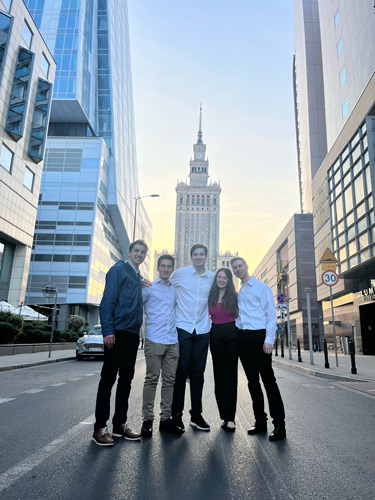
Deloitte Scholars in city of Warsaw, Poland.
“Poland is currently a very exciting place in Europe for economic and business opportunities,” said John Sikorski, assistant teaching professor in Mendoza’s Business Ethics and Society Program, who led 18 students from the Deloitte International Business Scholars Program on the trip. “In the words of U.S. Ambassador Mark Brzezinski with whom our group met, ‘It’s a popping and percolating place to be.’” Sikorski said that the ambassador emphasized to students the importance of the strategic relationship between Poland and the U.S., with a focus on both the Russian war in Ukraine as well as multibillion dollar investments by U.S. corporations into the Polish economy.
Over the course of 10 days, the Deloitte International Business Scholars met with top business leaders, entrepreneurs and government officials. Students were welcomed by Dominik Andrzejczuk, an entrepreneur who left idyllic Silicon Valley in California for Poland. He described the many benefits that could be found in Warsaw: gender equality in the tech space, the quality of engineering talent available, the affordable standard of living and an emphasis on healthy work/life balance.
In the first days of the trip, the undergraduates met with several business leaders in various industries: White Star Real Estate Managing Partner Brian Patterson, CEO of SuperDrób Piotr Her and Deloitte Managing Partner for Poland Tomasz Konik.
Konik helped organize a panel of other Deloitte leaders at the company’s Warsaw headquarters, which served as one of the highlights of the trip. Students listened as Deloitte managing partners and board members explained the challenges their company faces while building an ethical business culture in a post-Communist country as well as the exciting economic opportunities available there.
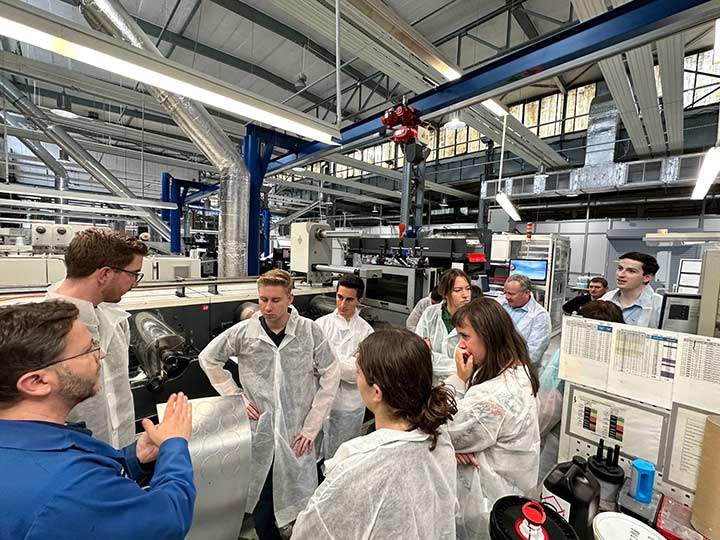 But one of the most surprising and moving aspects of the trip was hearing how business leaders were helping house Ukrainian refugees.
But one of the most surprising and moving aspects of the trip was hearing how business leaders were helping house Ukrainian refugees.
“One thing that struck the students was the hospitality of the Polish people and the business leaders with whom we met, who have shown empathy and compassion for Ukrainian refugees,” said Sikorski. “Students repeatedly heard the story of business leaders taking the initiative to personally open their homes and make a difference in supporting people who had to leave Ukraine because of the war.”
This thread of service became part of another message: Many business leaders in Poland take care to balance work, family and faith. Throughout the trip, students mentioned a seeming disconnect between life at work and life at home in the U.S. When the students raised this, Polish business leaders explained that it was completely normal to bring their faith and ethical values to work.
“The goal of this trip was to expose students to a vibrant economy in which Catholic social teaching and faith values play a significant role in shaping the business mindset,” said Sikorski. “It demonstrated how business can be honorable and successful at the same time, which is very much in keeping with the Mendoza College of Business motto to ‘Grow the Good in Business.’”
Students also had time to visit key attractions including Warsaw Old Town, the John Paul II Center in Kraków and the Wieliczka Salt Mine Tour, which is one of the original UNESCO world heritage sites. The group also spent time visiting several historical sites related to World War II, such as touring Kazimierz (the Jewish District of Kraków), the Museum of the Warsaw Uprising and the Schindler Factory in Kraków. Sikorski explained how impactful it was for students to see the suffering of Warsaw and its complete destruction following the heroic 1944 uprising against Nazi occupation, and then on the same day, to go to the historic city center that has been rebuilt according to the original plans.
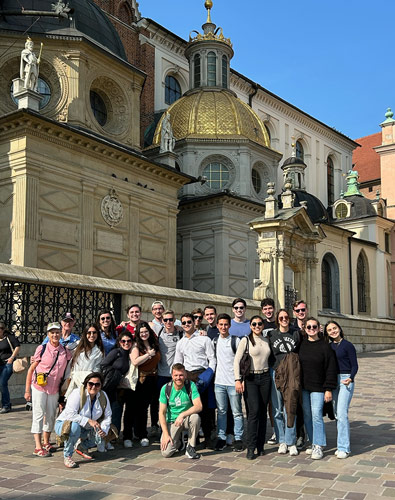 “It was a profound experience to see what the city went through and how resilient the people were, despite living under communism, and then to see the kind of cosmopolitan, economic hub that it has become today, especially over the course of the last decade,” he added.
“It was a profound experience to see what the city went through and how resilient the people were, despite living under communism, and then to see the kind of cosmopolitan, economic hub that it has become today, especially over the course of the last decade,” he added.
Although the trip was meant to expose students to the thriving business environment, Deloitte Scholars were also invited to present a business ethics panel at the Cambridge Innovation Center in downtown Warsaw. The event called “Venture Cafe” acts as an open house in a meet-and-greet atmosphere for tech entrepreneurs and business leaders in Warsaw. Joined by local strategy consultant Marta Noran, Sikorski and Notre Dame students Connor Patrick (MSM ‘24, BBA ‘23), Madeline Ladd (BBA ‘25) and Teresa Quercaigrossa (MBA ‘23) spoke on the panel. The event, moderated by Curran, was followed by lively Q&A from the audience members, whose conversation focused on how ethics should inform business. Nearly 50 people from Warsaw attended.
“The students were peer-nominated to present on the panel. It was really important to give our students the opportunity to rise to the occasion as leaders,” said Sikorski. “In some ways, these students were pioneers in exploring potential future opportunities with Notre Dame’s presence in Poland.”

Related Stories
